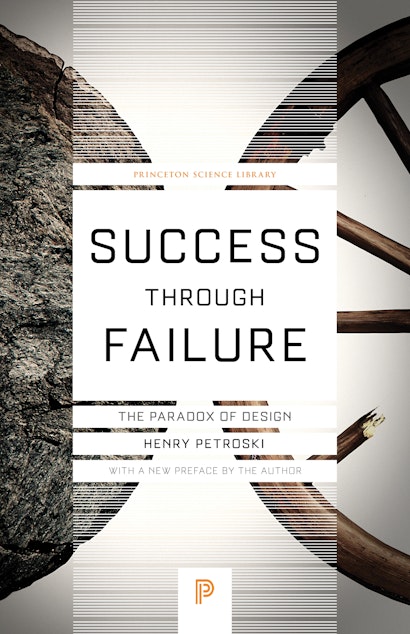Design pervades our lives. Everything from drafting a PowerPoint presentation to planning a state-of-the-art bridge embodies this universal human activity. But what makes a great design? In this compelling and wide-ranging look at the essence of invention, distinguished engineer and author Henry Petroski argues that, time and again, we have built success on the back of failure—not through easy imitation of success.
Success through Failure shows us that making something better—by carefully anticipating and thus averting failure—is what invention and design are all about. Petroski explores the nature of invention and the character of the inventor through an unprecedented range of both everyday and extraordinary examples—illustrated lectures, child-resistant packaging for drugs, national constitutions, medical devices, the world’s tallest skyscrapers, long-span bridges, and more. Stressing throughout that there is no surer road to eventual failure than modeling designs solely on past successes, he sheds new light on spectacular failures, from the destruction of the Tacoma Narrows Bridge in 1940 and the space shuttle disasters of recent decades, to the collapse of the World Trade Center in 2001.
Petroski also looks at the prehistoric and ancient roots of many modern designs. The historical record, especially as embodied in failures, reveals patterns of human social behavior that have implications for large structures like bridges and vast organizations like NASA. Success through Failure—which will fascinate anyone intrigued by design, including engineers, architects, and designers themselves—concludes by speculating on when we can expect the next major bridge failure to occur, and the kind of bridge most likely to be involved.
Henry Petroski (1942–2023) was the Aleksandar S. Vesic Distinguished Professor Emeritus of Civil Engineering at Duke University. His many books include To Engineer Is Human, The Evolution of Useful Things, The Pencil, and The Toothpick.
"From [Petroski's] vantage point, failures in design and construction present perfect teaching opportunities. They are object lessons in the history and practice and beauty of engineering."—Cornelia Dean, New York Times
"The moral Petroski draws—success breeds hubris and catastrophe, failure nurtures humility and insight—is worth pondering."—Publishers Weekly
"Success through Failure is insightful and accessible."—J. M. Ottino, Nature
"Petroski's main message deserves notice. He points out that failure is an inherent part of success when it comes to design and innovation, and failure can come in many forms."—Martin Ince, Times Higher Education Supplement
"An excellent read."—Architectural Science Review
"This is a book about human nature in design settings and its role in the development of products and our built environment. . . . Ingenuity is explored as a pendulum that swings between success and failure, driven by design philosophy and practices in a given place and time."—Library Journal
"From ancient Roman engineers dismayed at the failure of stone-arch bridges to twenty-first-century American architects stunned by the collapse of the Twin Towers, designers have frequently learned valuable principles through hard tutelage. Lucid and concise, this study invites nonspecialists to share in the challenge of trial-and-error engineering."—Bryce Christensen, Booklist
"Petroski tells iconic tales to demonstrate that mistakes are not obnoxious by-products of innovation but fundamental clues to the ideal."—Fast Company
"[An] engaging and readable book. . . . Petroski uses countless interesting case histories to show how failure motivates technological advancement. . . . I recommend you keep a copy of Petroski's book on hand and flip through it next time you're feeling seduced by success."—Steven Cass, IEEE Spectrum
"Success through Failure is an insightful and accessible foray into design. The book is a page-turner, with an intensity that builds as you read. I found myself waiting for discussions of various topics—from the Tacoma Narrows Bridge to the space shuttle—only to find them before me several pages later. A must-read for any design engineer, or anyone who wants to understand how great designs evolve."—Jonathan Cagan, coauthor of The Design of Things to Come and Creating Breakthrough Products
"This most readable book presents design from an engineer's point of view; its author is one of the masters of this approach. It will enrich engineers' understanding of their profession's heritage and tools, and help nonengineers see everything from slide shows to skyscrapers in new ways."—Edward Tenner, author of Our Own Devices and Why Things Bite Back

